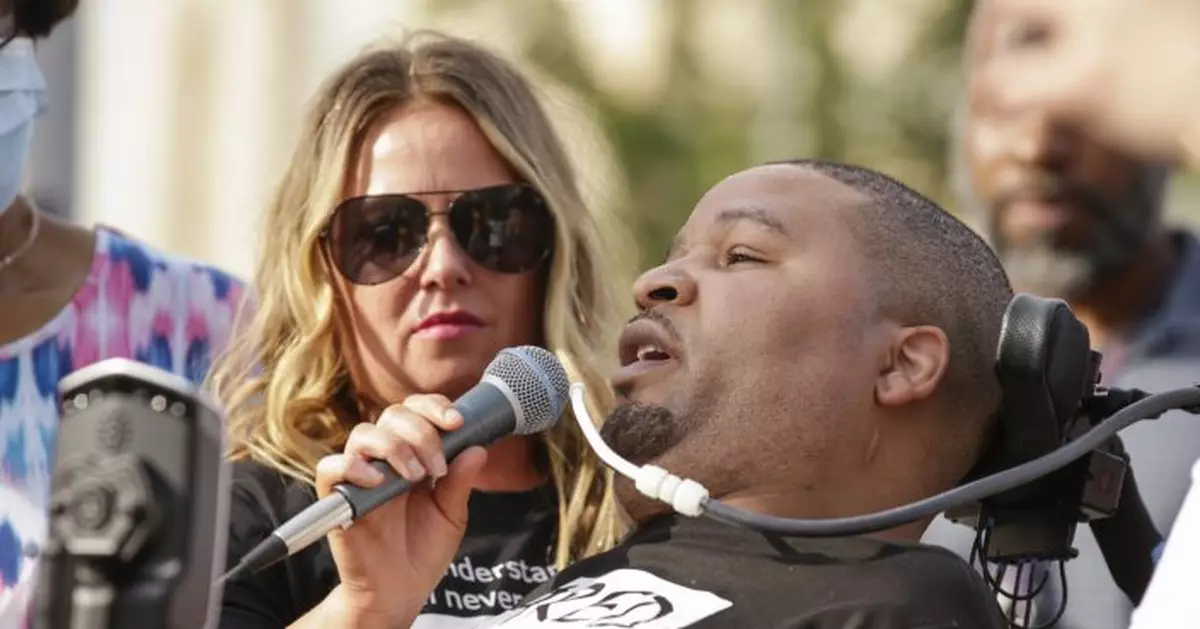Cedar Rapids paid $619,000 to defend a white police officer against an excessive force lawsuit brought by a Black man he shot and paralyzed, before Iowa's second-largest city reached a landmark $8 million settlement with the man, a city spokeswoman said.
The previously undisclosed legal costs add to the sizeable payout stemming from the 2016 shooting of Jerime Mitchell by then-police officer Lucas Jones during a traffic stop. The city budget will cover the first $500,000 before insurance kicks in, an amount nearly twice as much as Cedar Rapids will save this year by closing a golf course and 20 times as much as it will spend on a new board to review complaints against officers.
Jones allegedly pulled over Mitchell for not having a license plate light, and their late-night encounter quickly escalated. After struggling with the officer and his dog, Mitchell eventually got into his truck and started driving with Jones clinging to him. Jones fired three times, paralyzing Mitchell with a bullet to the neck. A prosecutor cleared Jones in the shooting, concluding he fired in self-defense.

FILE - In this Jan. 25, 2017, file photo, then- Cedar Rapids police officer Lucas Jones is seen in Cedar Rapids, Iowa. Cedar Rapids paid $619,000 to defend Jones against an excessive force lawsuit brought by a Black man he shot and paralyzed before the reaching a landmark $8 million settlement. The previously unaccounted legal costs add another expense for taxpayers in the 2016 shooting of Jerime Mitchell by former Cedar Rapids police officer Jones during a traffic stop. (Stephen MallyThe Gazette via AP, File)
Mitchell and his wife filed the lawsuit in 2017, saying he suffered debilitating injuries as a result of Jones' negligence. The lawsuit alleged that Jones had no basis for the traffic stop, improperly used force on Mitchell in several ways and fired on the unarmed Mitchell without justification. It also alleged that the city had been negligent by employing Jones, who was cleared after fatally shooting 21-year-old Jonathan Gossman in 2015.
The day before the case was supposed to go to trial last month, the city announced that it had reached an $8 million settlement with Mitchell and that its insurer would pay the full amount. It's the largest settlement for a police shooting in Iowa history. Cedar Rapids admitted no wrongdoing, insisting that Jones acted properly given the circumstances of the stop.
The city incurred $688,000 in legal expenses during the four-year case, on top of extensive work by its staff attorneys who represented the city but did not track their hours, spokeswoman Maria Johnson told The Associated Press on Wednesday. That includes $619,000 paid to the Lynch Dallas law firm, which was hired to represent Jones in the case, she said.
Lynch Dallas also defended the city and Jones against a lawsuit filed by relatives of Gossman, who was shot 24 times by Jones and another officer after fleeing a drug-related stop with a handgun in 2015. A federal appeals court in December upheld a judge's dismissal of that case, ruling that the use of deadly force was reasonable. As in the Mitchell case, Jones had released his dog, Bane, to attack the suspect before shooting him.
A risk fund in the city’s budget will cover $500,000 of the legal expenses, which is the amount of its deductible under the insurance policy, Johnson said. Insurance will cover the rest.
The legal costs escalated and Mitchell's trial was delayed as the city sought to defend its ability to keep the public from seeing records related to the shooting.
The city insisted on sharing investigative police records with Mitchell's lawyers only if they agreed not to release them publicly, a condition they refused. A judge ordered the city to produce the records without a protective order preventing their public disclosure.
The city and Jones appealed to the Iowa Supreme Court, which unanimously upheld the judge's order in 2019. But the court also affirmed that police records can be exempt from Iowa's open records law forever, even after investigations are closed. Public safety agencies routinely cite that decision in denying requests from reporters and lawyers.
Despite the settlement, the Mitchell case is still generating more litigation costs for the city, which fired Jones last year after his testimony in a deposition prompted an investigation of his handling of a different 2016 traffic stop.
The city is now paying two law firms to defend against an appeal filed by Jones in which he seeks to be reinstated. The Cedar Rapids Civil Service Commission upheld Jones' firing in December, and he has asked a judge to overturn that decision. A Cedar Rapids lawyer is defending the commission, while a Des Moines-based law firm is representing the city. A hearing is set for August.


